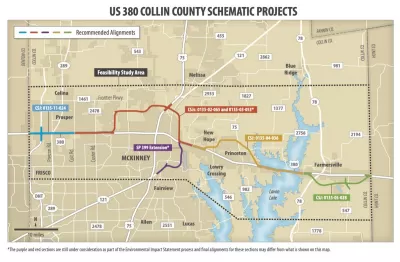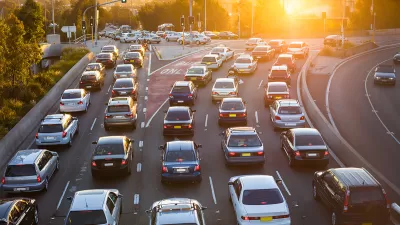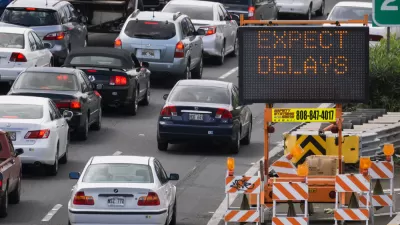The thirst for urban expansion and new highway capacity hit a roadblock on the fringe of the Dallas-Fort Worth metropolis.

A contentious battle over a planned expansion of Highway 380 in the Dallas-Fort Worth region is detailed in a recent article by Peter Simek.
Highway 380 is "hardly more than a little two-lane road," according to Simek, connecting remote farming communities between Greenville and into New Mexico, passing through the city of McKinney, where Simek lays the scene.
"In 2016, residents living along Highway 380 received notices from the Texas Department of Transportation informing them that Highway 380 would soon be transformed into a major freeway—a limited-access traffic artery as wide as 10 lanes in parts."
TxDOT is proposing the expansion in response to previous growth that has expanded the footprint of Dallas-Fort Worth region to these former agricultural lands. And more growth is expected: "According to the Texas Demographic Center, Collin County’s population is expected to grow from fewer than 800,000 people in 2010 to more than 3.8 million by 2050," according to Simek.
Growth or not, residents of McKinney aren't happy about the TxDOT's plans for Highway 280.
But just as traffic engineers tend to see limited-access freeways as the best solution to the challenges of urban growth, people generally don’t want freeways running through their backyards. As TxDOT began rolling out a suite of options for the design and location of the new freeway, the Highway 380 planning process devolved into the most contentious community battle in Collin County history.
The TxDOT chose a preferred alternative, with an estimated cost of $2.5 billion, for the expansion in March 2019 and embarked on an environmental study of the project at the beginning of 2020. Simek's focus, however, is on the local opposition to the plan, and the coalition of local residents and organizations working to prevent the project, turning neighbor against neighbor, in some cases, along the way.
FULL STORY: Does McKinney Really Need a New Highway?

Study: Maui’s Plan to Convert Vacation Rentals to Long-Term Housing Could Cause Nearly $1 Billion Economic Loss
The plan would reduce visitor accommodation by 25,% resulting in 1,900 jobs lost.

North Texas Transit Leaders Tout Benefits of TOD for Growing Region
At a summit focused on transit-oriented development, policymakers discussed how North Texas’ expanded light rail system can serve as a tool for economic growth.

Using Old Oil and Gas Wells for Green Energy Storage
Penn State researchers have found that repurposing abandoned oil and gas wells for geothermal-assisted compressed-air energy storage can boost efficiency, reduce environmental risks, and support clean energy and job transitions.

Santa Barbara Could Build Housing on County Land
County supervisors moved forward a proposal to build workforce housing on two county-owned parcels.

San Mateo Formally Opposes Freeway Project
The city council will send a letter to Caltrans urging the agency to reconsider a plan to expand the 101 through the city of San Mateo.

A Bronx Community Fights to Have its Voice Heard
After organizing and giving input for decades, the community around the Kingsbridge Armory might actually see it redeveloped — and they want to continue to have a say in how it goes.
Urban Design for Planners 1: Software Tools
This six-course series explores essential urban design concepts using open source software and equips planners with the tools they need to participate fully in the urban design process.
Planning for Universal Design
Learn the tools for implementing Universal Design in planning regulations.
Ascent Environmental
Borough of Carlisle
Institute for Housing and Urban Development Studies (IHS)
City of Grandview
Harvard GSD Executive Education
Toledo-Lucas County Plan Commissions
Salt Lake City
NYU Wagner Graduate School of Public Service





























